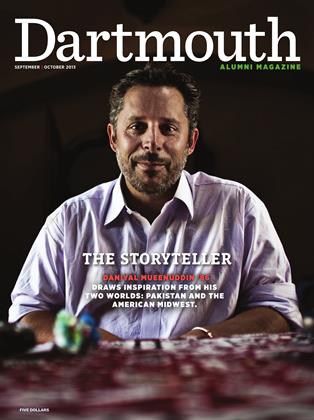The former labor secretary brings his analysis of income inequality to the big screen.
ROBERT REICH ’68
EDWARD GREW '66
BRIAN KELLY ’83
ZACH HAFER ’99
JOE LINDNER '51
ASHLEY TUDOR ’02
REMBERT BROWNE ’09
IN JUANUARY HOLLYWOOD'S GLITTERATI descended on Park City, Utah, for the 2013 Sundance Film Festival: Robert Redford, Daniel Radcliffe, Jessica Biel, Matthew McConaughey, Paris Hilton and, in his debut appearance, former Secretary of Labor Reich.
“I was rather mystified,” Reich concedes. “I know a lot about the world of government. I know about the world of academe. I know about book publishing. But this was a world that I simply had no acquaintance with at all.”
Reich is the star of a forthcoming documentary, Inequality for All, which turns a literal lens on rising income disparity in America. (Like Tom Cruise, Reich appears taller on screen than in person.)
Director Jason Kornbluth approached Reich about making the film after reading his 2010 book, Aftershock. Reich, who considers the growing income and opportunity gap in America to be one of the nation’s fundamental challenges, was keen to talk about the issue. “I’ve tried everything else and don’t feel like I’ve made much of a dent,” he says. “Film is the last frontier.”
At Sundance Inequality for All was awarded a special jury prize in the U.S. documentary competition. Reich joined the filmmakers in Park City for the festival as they sought a distributor for the film. After what Reich describes as “an intense week” of talking to industry insiders, Radius TWC, a division of the Weinstein Co., acquired the distribution rights. The documentary will premiere in select cities in September.
Those expecting Michael Moore-like gimmicks and “gotcha” interviews with villainous CEOs will be disappointed (or relieved). Instead, the documentary gives Reich a platform as he interprets the complex social and economic forces at play: stagnant middle class wages, the decline of unions, educational failures, money in politics, globalization, technology and so on.
Many of the scenes are filmed in the classroom at the University of California, Berkeley, where Reich is a professor of public policy. At every point in the film, including a clever opening sequence in a Mini Cooper that plays on Reich’s diminutive size, Reich is front and center. “I was surprised that the director wanted as much of my own biography in the film as he wanted,” Reich says.
The most affecting parts of the film document Reich’s lifelong commitment to social change. Even those who know the story of Reich’s first meeting with a fellow Rhodes Scholar and future president as they crossed the Atlantic together for Oxford will appreciate Reich’s retelling of that fateful encounter. He recalls being sequestered in his cabin, horribly seasick. “And then there was a knock on the door and this fellow was there, this kind of tall gangly Southerner,” says Reich. “He had chicken soup in one hand and crackers in the other and he said, ‘I hear you aren’t feeling too well. I thought these might help. My name is Bill Clinton.’”
In both the film and in person, Reich comes across as wistful in assessing the impact of his career efforts, particularly his stint in the Clinton administration. “I was so frustrated by our inability to make more progress more quickly that I think I became sort of a bit too predictable,” he says. (Others are less critical. Time magazine picked Reich as one of the 10 best U.S. Cabinet secretaries of the 20th century, along with the likes of George Marshall and Robert Kennedy.)
Will Inequality for All shape Americans’ evolving and contentious views about income inequality? Perhaps, though it is hard to imagine today’s polarized polity grappling meaningflly with such a politically fraught issue.
In any event, the film pays homage to Reich’s tireless dedication to public service. One is left thinking that if the film does not change American attitudes, he will almost certainly try something else. Music video?
Reich at the Sundance Film Festival in Park City, Utah, in January 2013
CHARLIE WHEELAN is a senior lecturer and policy fellow at the Rockefeller Center at Dartmouth. His most recent book, The Centrist Manifesto, calls for a new political party of the middle.
“I’ve tried everything else,” Reich says of getting his message out. “Film is the last frontier.”
 View Full Issue
View Full Issue
More From This Issue
-
 Cover Story
Cover StoryThe Storyteller
September | October 2013 By KEVIN NANCE -
 Feature
FeatureModern Family
September | October 2013 By ALEC SCOTT ’89 -
 Feature
FeatureThe Surrogacy Option
September | October 2013 By Lisa baker ’89 -
 Feature
FeatureClass Notes
September | October 2013 By DARTMOUTH COLLEGE LIBRARY -
 Feature
FeatureNotebook
September | October 2013 By DARTMOUTH COLLEGE -
 Sports
SportsRunning for His Wife
September | October 2013 By DAVID MCKAY WILSON
Charles Wheelan ’88
-
 Cover Story
Cover StoryBEYOND ME
December 1989 By Charles Wheelan ’88 -
 Feature
FeatureRUNNING ON IDEAS
OCTOBER 1991 By Charles Wheelan ’88 -
 Feature
FeatureWhat Comes NEXT
JUNE 1998 By Charles Wheelan ’88 -
 Cover Story
Cover StoryAre Americans Saving Enough?
JANUARY 1999 By Charles Wheelan ’88 -
 Feature
FeatureCleanup Pitcher
MAY 2000 By Charles Wheelan ’88 -
 Alumni Opinion
Alumni OpinionDollars and Sense
Jan/Feb 2004 By Charles Wheelan ’88








